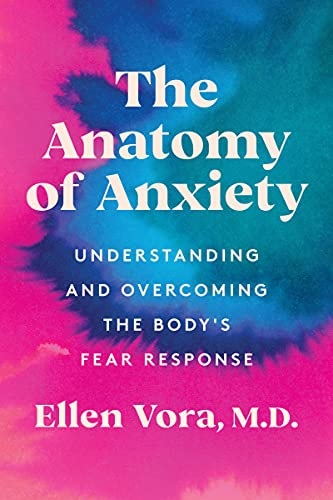I’m currently enjoying Dr. Ellen Vora’s new book, The Anatomy of Anxiety, so much that I’m going to be quoting a lot from it in the coming months.
Near the beginning of her book, she talks about our desire to crush, soothe, to immediately rid ourselves of anxiety when it props up.
But sometimes, instead of shutting it up, we need to listen to it — particularly if it’s telling us something about ourselves.
“When our lives don’t align with our values or capabilities, we can feel anxious — but this feeling can also serve as a critical indicator that we need a course correction.
…. maybe you are working in a job that fit your life when you were younger but now feels as if you took a wrong turn along the way; or you might feel unable to sit idly by as the planet continues to heat up and sea levels precipitously rise.
Whatever the issue, this is your body’s way of telling you, Please look at this.
When you listen closely, this anxiety can point you in the direction of actions you need to take as well as the unique contribution you are here to make.
…. I tell my patients that they should embrace these feelings rather than trying to suppress or avoid them.
Instead of asking, How can I stop feeling so anxious?, we should be asking, What is my anxiety telling me?
It is natural to reflexively resist this uncomfortable feeling…..but when we do this, we can miss out on critical guidance.
What if you could learn to tolerate your anxiety long enough to hear what change is necessary?
What if instead of fearing and fighting true anxiety, you invite it in and hear what it has to say?”
In her book, she distinguishes between “false anxiety” and “true anxiety,” even while admitting there are many forms that don’t fall neatly into those two categories.
False anxiety can be punishing and dreadful, and don’t let the term “false” fool you.
There’s nothing fake about the symptoms.
She simply means that, in her framework, “false anxiety” rises from a physiological level.
It can be enormously complicated, but as simple as drinking too much coffee and suddenly feeling anxious about everything.
In that case, you certainly feel terribly anxious, but it’s arising from a physiological imbalance.
However, “true anxiety” (as she calls it) has a message about your life that’s beyond the physiology of your body, and it’s important to pay attention to what it’s telling you.
I think about Frederick Buechner’s description of “unexpected tears.”
We all cry at the loss of a loved one, but there have been times when I’m talking about something fairly pedestrian, and begin to shockingly choke up.
I had no idea I’d start crying before I said it, and yet there they are — the “unexpected tears.”
I’m certain you’ve had the same experience.
Buechner writes: “Whenever you find tears in your eyes, especially unexpected tears, it is well to pay the closest attention. They are not only telling you something about the secret of who you are, but more often than not, God is speaking to you through them of the mystery of where you have come from and is summoning you to where, if your soul is to be saved, you should go next.”
So the “true anxiety” of which Vora writes, and the “unexpected tears” that Buechner points to, can be enormously useful.
Horribly difficult, yes, particularly the anxiety portion.
But as I’ve been reading Vora’s book, I’ve been making a conscious effort to try to figure out what my anxiety is telling me beyond “IT’S TERRIBLE TO FEEL THIS WAY,” and ask, “But why am I?”
Sometimes, I can find a reason, other times, not. But it’s been useful.
Finally, on the topic of anxiety, I’d suggest this helpful new read from Dr. John Cottone, where he explains four types of anxiety: “situational,” “biological,” “psychological,” and “existential.”
He suggests that each requires a different form of care, and which type of therapy is particularly helpful.

